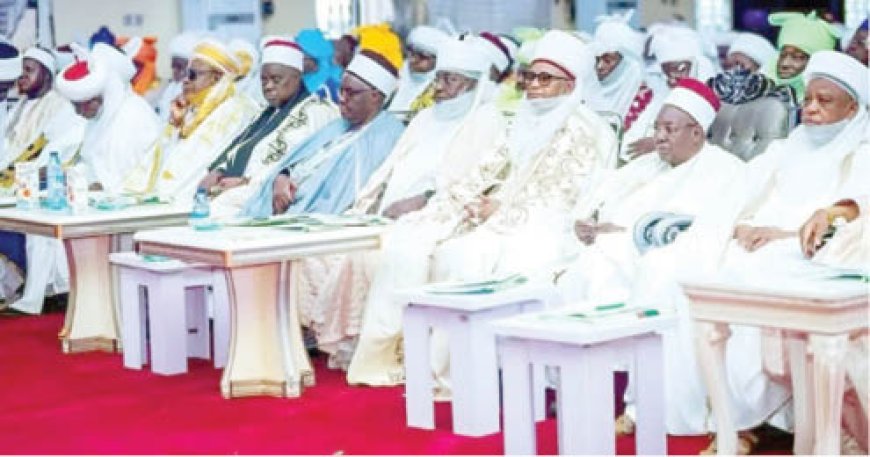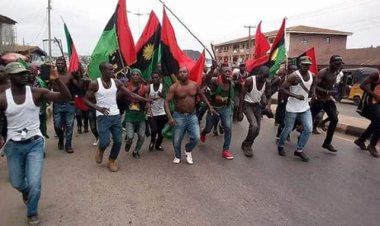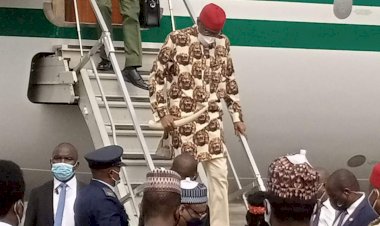Christian genocide claim in Nigeria false – Sultan

By Ismail Adebayo (Birnin Kebbi) & Mumini AbdulKareem (Ilorin)
The Sultan of Sokoto and Chairman of Northern Traditional Rulers Council (NTRC), Alhaji Sa’ad Abubakar III, has dismissed the claims of Christian genocide in Nigeria as a false alarm, saying the narratives should not be allowed to continue.
The Sultan disclosed this at the 2025 General Assembly of Northern Traditional Council, with the theme “Strengthening Community Collaboration for Lasting Peace and Security in Northern Nigeria”, held in Birnin Kebbi, Kebbi State, on Tuesday.
“They have been saying there was genocide of Christians in Nigeria by the Western countries such as the USA, Canada and others. Where, when? These are false stories,” he said.
The Sultan explained that it was not possible that such killing would happen in any part of Nigeria, and traditional rulers would not know about it.
Teenage girl acts as Vice President for one day
Women, children killed in another Niger tanker explosion
He appealed to leaders in the country to regulate social media due to damage and negative content that their operators are publishing against the country and individuals.
The Sultan also urged Nigerians to refrain from castigating the military, stressing that without their sacrifices, the nation would not have remained a united and peaceful entity.
He acknowledged that the military has its challenges and shortcomings but described social media comments alleging that security forces are colluding with bandits as “callous and unbecoming.”
He reaffirmed the commitment of traditional rulers to the survival of democracy and loyalty to all elected leaders, including the President, National and State Assemblies, and Governors.
The Sultan also called on traditional rulers present at the meeting to unite and collectively address the nation’s challenges, noting that their recommendations and suggestions would be forwarded to Northern Governors for necessary action.
Representing President Bola Ahmed Tinubu, the Chief of Staff, Femi Gbajabiamila, said traditional leaders play a vital role in promoting peace and stability.
He said they possess the capacity to reduce tension, resolve conflicts, and broker peace in crises.
Declaring the meeting open, Kebbi State Governor Nasir Idris pledged continued support for traditional institutions, including improving their welfare and providing modern facilities.
The Chief of Defence Staff, General Christopher Musa, assured that all security agencies are working tirelessly to restore peace and stability in the North.
He described traditional rulers as the first line of engagement between the government and the people, commending their wisdom and steadfastness as a source of inspiration to the armed forces.
200 churches, 6,000 mosques destroyed in North – MURIC
The Muslim Rights Concern (MURIC) has accused Nigerian Christian leaders of using the United States as a tool of intimidation to pressure the federal government and marginalise Muslims in the country.
In a statement on Tuesday by its Executive Director, Professor Ishaq Akintola, the Islamic human rights group alleged that reports of “Christian genocide” in Nigeria were surprisingly sent to the US by some leaders back home.
This, he noted, is because the US is perceived as a Christian superpower, rather than to African institutions such as the African Union or ECOWAS.
According to MURIC, the move reveals a deeper agenda of neo-imperial domination and religious favouritism aimed at securing undue advantages for Christians.
“We have followed the current controversy over the allegation that only Christians are being killed in Nigeria with deep concern.
“Nigerian Muslims also suffer killings, often in larger numbers, but their plight goes unreported because global narratives are controlled by a Christo-Western media”, he said.
Akintola argued that both Christians and Muslims have been victims of terrorism, noting that criminal groups often target crowded places such as churches and mosques.
“This explains why the main victims in Christian-concentrated states like Benue and Plateau are Christians, while those in Muslim areas like Sokoto and Zamfara are Muslims.
“While about 200 churches were destroyed across the North, no fewer than 6,000 mosques were also demolished in the same region”, he said.
MURIC further alleged that Muslims in Southern Nigeria suffer systemic marginalisation, alleging that their grievances are ignored by both state and federal authorities.
It also accused sections of the Nigerian media of bias.
He said some of them sensationalised the killings of Nigerian Christians while those of Muslims are downplayed or ambiguously described.
MURIC described the recent reports to the US as part of an attempt to arm-twist the Nigerian government into granting what it called “undeserved political and economic favours” to Christians.
Citing America’s support for Israel and its global military actions, Akintola questioned the moral standing of the US to judge Nigeria on human rights or religious issues.
“It is moral bankruptcy to report Nigeria to America, least of all to former President Donald Trump. How can a country that funds genocidal wars sit in judgment over another,” he said.
MURIC further accused some Christian-owned media outlets of fanning religious division by excluding Muslim voices from national discussions.
“Muslim commentators are deliberately shut out of Christian television and radio stations that freely demonise Islam. Such practices undermine professionalism and fairness in journalism”, Akintola maintained.
MURIC urged the federal government not to yield to what it called “Christian blackmail gimmicks” or to turn Nigerian Muslims into “guinea pigs in a dangerous experiment.”
Why Nigeria should not be designated country of concern – Bishop Kukah
Bishop Matthew Hassan Kukah, the Catholic Bishop of Sokoto Diocese, has urged the international community not to re-designate Nigeria as a “Country of Particular Concern” (CPC) over alleged religious persecution, warning that such a move could undermine ongoing efforts to foster peace and interfaith dialogue.
Speaking at the launch of the Aid to the Church in Need (ACIN) 2025 World Report on Religious Freedom in the World held at the Augustinianum Hall, Vatican City, on Tuesday, Bishop Kukah acknowledged the country’s deep-seated challenges but insisted that Nigeria should be supported — not punished — as it works to overcome religious violence and national disunity.
The report documents a global decline in religious freedom, with more than 5.4 billion people living in countries where such rights are restricted.
It identifies authoritarianism, religious extremism, ethno-religious nationalism, and organised crime as key drivers of persecution across the world.
Kukah said that while Nigeria continues to grapple with terrorism, insecurity, and ethnic tensions, the situation cannot simply be categorised as targeted persecution of Christians.
“We are not dealing with people going around wielding machetes to kill me because I am a Christian. I live and work in Sokoto, right in the womb of Islam, where collaboration between Christians and Muslims remains possible. Our lives should be defined by a better narrative,” he said.
The cleric, however, admitted that Nigeria’s security breakdown has created conditions for what he described as “genocide” in some communities, citing the federal and state governments’ failure to contain violence and protect citizens.
“Nigerians are dying unacceptable deaths across the country — not only because of their religion but also their ethnicity. We are in the cusp of a weak state with a clear lack of capacity to arrest the descent into anarchy,” Kukah said.
He described the eight years under former President Muhammadu Buhari as “the worst phase in interfaith relations,” accusing the administration of policies that alienated Christians and emboldened jihadists.
“Under Buhari, to gain power, it was more important to be a northern Muslim than to be a citizen of Nigeria,” he said.
Bishop Kukah noted that President Bola Tinubu’s administration has shown inclusiveness and goodwill through recent appointments that balance religious representation in government.
“The President and Vice President are Muslims, yet Christians have not felt alienated. The Chief of Defence Staff, the Director of DSS, and the INEC Chairman are Christians. These are confidence-building measures aimed at restoring trust among Nigerians,” he said.
Citing the Global Terrorism Index Report 2025, Kukah acknowledged a 37 percent decline in terrorist attacks in 2024 but cautioned that religious identity still plays a decisive role in violence, particularly against Christians in northern Nigeria.
He also called on the government to ensure full constitutional compliance across all states, particularly regarding the application of Sharia law in 12 northern states, which he said fuels mob justice and discrimination.
“The President should go to court to have the adoption of Sharia law declared unconstitutional. The secular state anticipated by the Constitution must be enforced,” he said.
Kukah further highlighted subtle forms of persecution faced by Christian minorities in the North, such as denial of land for church construction, lack of access to religious education in public schools, and exclusion from employment opportunities.
The bishop cautioned that re-designating Nigeria as a “Country of Concern” would hinder the progress of ongoing interreligious dialogue and government collaboration with civil society.
The cleric also criticised past U.S. administrations, alleging that the Obama and Biden administrations’ refusal to sell arms to Nigeria during the Goodluck Jonathan presidency weakened the fight against Boko Haram.
He appealed to former U.S. President Donald Trump to lift restrictions and assist Nigeria in securing the tools needed to defeat terrorism.
.

















































